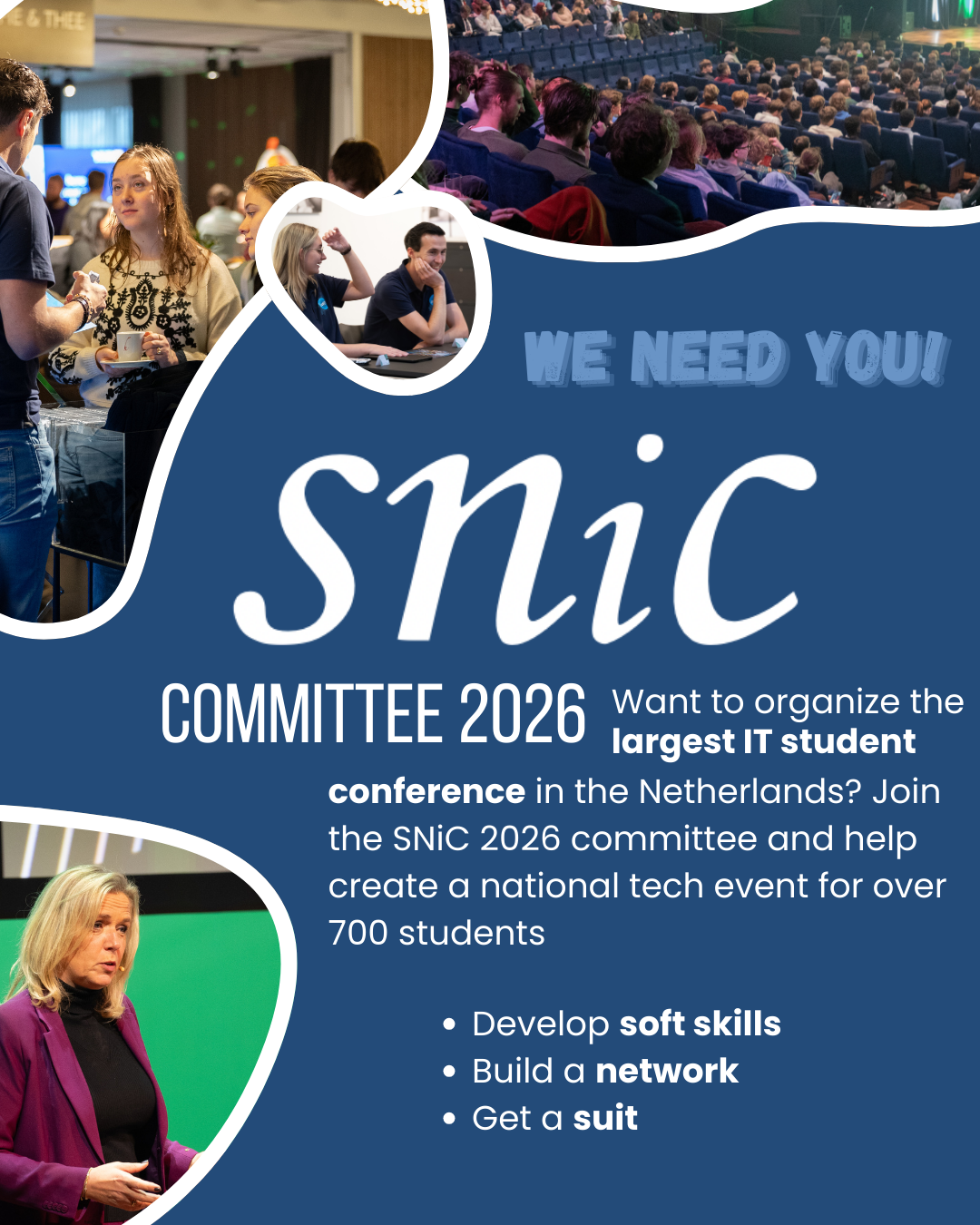SNiC committee 2026 needs you!

Thu, 18 Sep 2025
written by Meike Ebbinkhuijsen
In this blog, we will describe what it means to be a SNiC committee. If you have any more questions, please ask them to Florien Palm extern@svcognac.nl or Olivier Zanders treasurer@svcognac.nl. If you want to apply, send your experience and a little motivation before 26th of sept to Florien.
General
The SNiC committee is responsible for organizing the annual congress for Dutch Computer Science Students. The congress focuses on a current theme in computer science and includes a diverse program of expert speakers, engaging activities such as speeddates and business cases, and networking opportunities.
Central meetings
Roughly every 2 months you will have a central meeting in Utrecht with all the study associations associated with SNiC. For this meeting, you write a progress report and update your budget and you will discuss it with everyone there. Travel costs will be refunded (as it is for all travel that you do for SNiC such as company visits, or going to the location of your congress).
Perks
There are also some nice benefits when you become a part of the next SNiC committee, such as:
- A suit, paid for by the SNiC foundation
- SNiC on Tour: visit all associations with your team to hype people up (and enjoy a few beers)
- Develop soft skills you’ll use for the rest of your career
- Build a network that might land you your next internship or job
Function specific
Chair
Average time per week: 4 hours
Responsible for overseeing the overall progress of the committee. Tasks include planning and leading meetings, setting agendas, monitoring the progress, and acting as the main contact point for all involved associations.
Secretary
Average time per week: ?
Both AvailabilIT (SNiC of 2025) and SustainabilIT (SNiC of 2024) chose not to include a secretary and instead divide the answering of mails among the chair, speakers, external affairs, and pr. Making minutes of the meetings was switched around as well.
Planning
As chair, there are not really times where you are busier or less busy. It is quite constant. Leading up to the congress, there is more stress of course.
Treasurer
Average time per week: 2-3 hours
Manages the financial side of the congress. This includes drafting and maintaining the budget, processing invoices, tracking expenses, and ensuring the financial health of the event from start to finish.
Planning
The workload as treasurer is quite constant. After the congress you are especially busy with finalising all the invoices and the settlement.
Logistics
Average time per week: 3-5 hours
Organizes all practical matters, such as selecting the congress venue, arranging catering, booking transportation for participants, and coordinating any side activities during the congress.
Planning
At the beginning there is a lot of work to find a location. Then it is best to get started on arranging buses as early as possible, so you will be busy with that. Then it is quite calm for a while. The last three months or so are busy again.
External Affairs
Average time per week: 5 hours
Responsible for acquiring and maintaining contact with sponsoring companies. This includes identifying potential partners, holding meetings with them, and negotiating sponsorship agreements. Additionally, the external affairs officers are the contact point for the business-related aspects of the congress, such as the company market, speed-dates and business cases.
Planning
The beginning is the most busy because you want to raise enough money for the go/no-go moment. Afterwards, it is a bit more calm. Leading up to the congress you are busy again with keeping in touch with companies and arranging things with them.
Speakers
Average time per week: 4 hours
Focuses on content by identifying, contacting, and scheduling speakers. This involves developing the program, preparing speaker briefings, and ensuring a well-balanced and engaging lineup.
Planning
Quite constant planning. You want to arrange enough speakers, but unlike external affairs you don’t have a hard deadline when things have to be signed.
PR
Average time per week: 4 hours
Handles promotion, branding, and communication. Responsibilities include developing a visual identity, creating promotional materials, managing social media channels, and ensuring consistent communication with external parties and participants.
Planning
How busy you are at certain times as PR depends a bit on if you decide to take up extra tasks. For example, I (Matthias) also do the website and contact universities next to being the chair. In general though, you will be busy before the congress to develop a visual identity and some sort of theme reveal. Then, for about half a year you don’t have much to do except for creating a promotion plan. Right before and after the summer holiday you are especially busy getting all the promo out.

